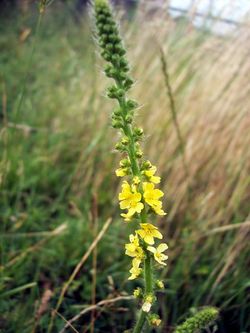Agrimonia eupatoria
Other Names: Agrimone, Agrimonia, Agrimonia eupatoria, Aigremoine, Aigremoine Eupatoire, Church Steeples, Churchsteeples, Cockeburr, Cocklebur, Common Agrimony, Da Hua Long Ya Cao, Eupatoire-des-Anciens, Fragrant Agrimony, Francormier, Herba Agrimoniae, Herbe-de-Saint-Guillaume, Herbe de Sainte Madeleine, Philanthropos, Soubeirette, Sticklewort, Thé des Bois, Thé du Nord, Toute-Bonne.
Agrimony is an herb. People dry the parts of the herb that grow above the ground to make medicine.
Agrimony is the name given to a genus of approximately 15 flowering species that can be found throughout the Northern hemisphere.
See also :
Special Precautions of Agrimonia eupatoria
- Agrimony seems to be safe for most adults when used short-term. But large amounts of agrimony might be unsafe because it contains chemicals called tannins.
- Agrimony can make some people's skin extra sensitive to sunlight and more likely to burn.
- Pregnancy and breast-feeding: Agrimony might be UNSAFE during pregnancy because it affects the menstrual cycle.
- Constipation : Avoid if constipated because it's an astringent.
- Surgery: Agrimony might affect blood sugar levels, so there is a concern that it might interfere with blood sugar control during and after surgery. Stop using agrimony at least 2 weeks before a scheduled surgery.
- Medications for diabetes (Antidiabetes drugs) interacts with Agrimony
- Don't confuse with Mullein
Benefits and uses of Agrimonia eupatoria are
Agrimony contains tannins, bitter glycosides, nicotinic acid amide, silica, coumarins, flavonoids (luteolin, apigenin, quercin), xanthophyllite, phytosterine, minerals (iron, calcium, silicon), vitamins A, B, C, P and K, volatile oil, carbohydrates, and polysaccharides.
- Irritable bowel syndrome (IBS).
- Diarrhea.
- Menstrual Issues: One of the most well known uses of agrimony is as a coagulant that can reduce bleeding in the body and help heal wounds. While menstruation isn’t a “wound”, per se, agrimony can be administered orally to reduce heavy menstrual bleeding and reduce inflammation to make those difficult periods a bit more tolerable.
- Digestive Issues: As an anti-inflammatory agent, agrimony has often bee used to eliminate digestive and gastrointestinal issues, particularly diarrhea and other Irritable Bowel Syndrome symptoms. By reducing irritation and inflammation in the membranes and tissues of the gut, agrimony can significantly soothe the stomach.
- Respiratory Issues: In a similar way as reducing inflammation in the gut, agrimony is also widely used to improve respiratory conditions that may involved inflammation, such as sore throats, chronic coughing, dry cough, bronchitis, and other sinus issues. For colds, coughs, and flus, agrimony can be an effective way to speed up the recovery and healing process.
- Antiviral:
- Agrimony extracts were shown to have antiviral activity against human herpes simplex virus, attributed to polyphenols in the herb.
- Inhibition of hepatitis B virus by an aqueous extract of Agrimonia eupatoria.
- Broad-spectrum antiviral effect of Agrimonia pilosa extract on influenza viruses.
- Sore throat.
- Diabetes: Agrimony has long been studied for its potential anti-diabetic properties, which would be a huge step forward in solving one of the great medical mysteries of our generation. Apparently, the active components of agrimony moderate the glucose and insulin uptake processes in the body better than many other natural diabetic treatments.
- Bladder Control: When we are very old and very young, bladder control is a major issue. The astringent quality of agrimony makes bladder control easier, eliminating those embarrassing bed-wetting moments and accidents. Since agrimony is non-toxic and has shown no signs of having negative effects on health, children have been using it for generations with no side effects or issues.
- Skin Health: When you are suffering from blemishes, pimples, rashes, acne, psoriasis, eczema, or any other skin condition, you can topically apply agrimony to the affected area and it can help to alleviate the issue. Agrimony can also be taken orally for the same effect. Agrimony works on irritation as well as blood eruptions that happen beneath the skin, like blotching and easy bruising due to its astringent properties.
- Detoxify the Body: Agrimony’s active ingredients, such thiamin, quercitrin, and catechins, have been directly linked to liver and gallbladder health. By optimizing the function of the liver and gallbladder, the body can more easily eliminate toxins that have built up, thereby preventing more serious health issues and promoting overall metabolic efficiency.
- Hair and Nail Strength: Silicic acid is also found in agrimony, and this unique compound is known to significantly boost the strength, appearance, and overall health of the nails and hair, preventing easy breakage or a dull appearance. It may not seem like the most important “health benefit”, but every little bit helps!
- Anti-Cancer Effects: Although research on the anti-cancerous effects of agrimony are still under consideration in various research studies, the potential of certain catechins and antioxidant compounds found in this perennial genus could contribute to treatments for cancer. Antioxidants neutralize free radicals, the dangerous byproducts of cellular respiration that can cause chronic diseases like cancer by causing health cells to mutate. The high count of antioxidants in agrimony bode well for this research.
References
- Li Y, Ooi LS, Wang H, et al. Antiviral activities of medicinal herbs traditionally used in southern mainland China. Phytother Res 2004;18(9):718-722
- Gray AM, Flatt PR. Actions of the traditional anti-diabetic plant, Agrimony eupatoria (agrimony): effects on hyperglycaemia, cellular glucose metabolism and insulin secretion. Br J Nutr 1998;80:109-14
- https://www.ncbi.nlm.nih.gov/pubmed/20055938
